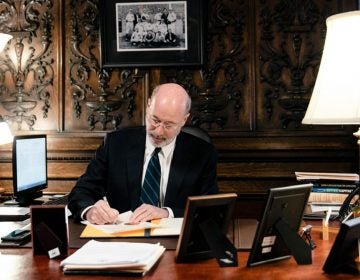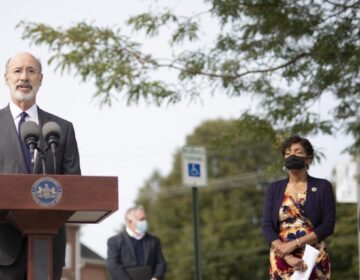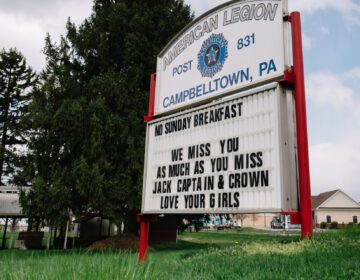Coronavirus update: Details on Philly’s June 5 reopening unveiled
Although health officials say Philly has slowed the spread of the coronavirus, they are fearful of losing those gains if social distancing measures are relaxed too quickly.
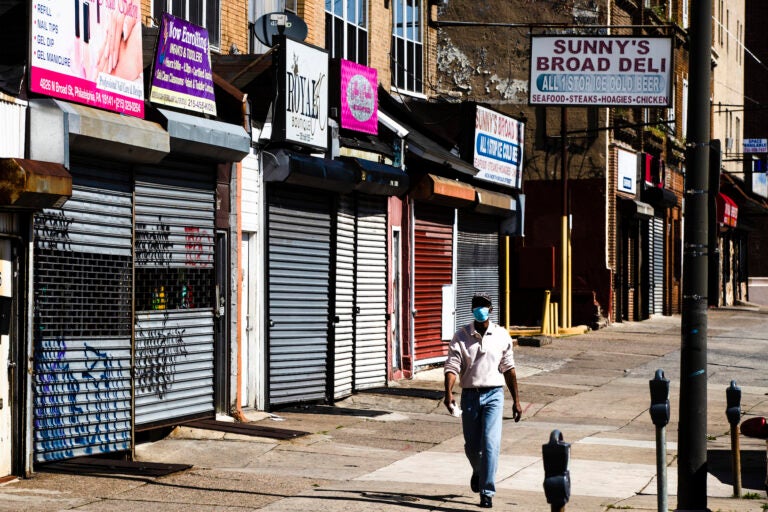
A person wearing a protective face mask as a precaution against the coronavirus walks past stuttered businesses in Philadelphia, Thursday, May 7, 2020. (AP Photo/Matt Rourke)
Updated 4:05 p.m.
Are you on the front lines of the coronavirus? Help us report on the pandemic.
Pennsylvania had 764 new positive COVID-19 cases as of Friday, the most recent data available, a 1.03% increase in total cases over the previous day. Over the past seven days, the commonwealth has recorded an increase of 4,774 cases, or 6.80%.
The state has recorded 74,984 positive cases in total.
Statewide, Pennsylvania has a total of 5,464 deaths resulting from COVID-19. The Department of Health says this is the result of “continued work to reconcile data from various sources,” and that the deaths have occurred “over the past several weeks.”
Philadelphia reported 225 new positives Friday. The city has recorded 22,405 cases so far, and 1,278 deaths.
Details on Philly’s June 5 reopening unveiled
Philadelphia Mayor Jim Kenney announced details on how the city’s shift to a “yellow” phase of reopening next week will diverge from the state’s guidelines.
During his daily briefing, Kenney unveiled what the administration is calling its “Safer At Home” plan. Though it relaxes many of the restrictions that have been in place for months under the “red” phase of public safety measures, officials caution it is still far from a return to normal.
“Social distancing is not going away,” Kenney said. “We may be heading into yellow, but we are, again, safer at home.”
The strategy aims to begin reviving the economy while keeping in place a number of tools to prevent viral spread. The list of businesses and services allowed to resume operations under modified protocols starting June 5 includes retail shops, child care centers, outdoor camps, warehouses, manufacturing and offices. However, officials stress the need for precautionary measures like wearing masks, wiping down surfaces, and maintaining appropriate physical distance. Industry specific details on the plan are available here.
Outdoor dining at restaurants is not set to resume on June 5, as officials continue finalizing a safe model.
Health Commissioner Dr. Thomas Farley said the city will be evaluating data regularly, and if there are signs the rate of infection is rising dangerously, Philadelphia will move back under the more restrictive measures. However, there is no one specific metric that would cause that reversal.
Enforcement of the new measures will come through city inspectors. Although without nearly enough personnel to comprehensively monitor the whole city, Farley implored business owners and city residents to self-police public health behavior.
“Take this seriously,” Farley said.
One major deviation between the city’s approach in this phase of re-opening from the state’s concerns public gatherings, including religious services. Though state guidance allows for groups of up to 25 people to safely assemble, the city is “strongly recommending against” any gatherings. Farley pointed to the significant health risks of people gathering for sustained services indoors.
Kenney also addressed protests and unrest around the country over recent killings of unarmed Black people in Minnesota, Georgia, and Kentucky.
“America’s original sin of racism has not gone dormant,” Kenney said. “Black Americans are outraged, I am too.”
“All this is totally unacceptable,” he added.
With demonstrations planned outside of City Hall on Saturday, Kenney said he supports residents’ right to protest, so long as there is no violence directed at people or property.
Philly preparing its own re-opening measures
While Gov. Tom Wolf announced last week that the entire state will ease the most restrictive stay-at-home orders by June 5, officials in Philadelphia are expected to release modified plans of their own this afternoon for moving to the “yellow” phase.
At the city’s daily coronavirus briefing Thursday, Mayor Jim Kenney said local departments are developing their own protocols, guidelines, and metrics for re-opening.
“Hang tight, we’ll have all that for you tomorrow,” Kenney said.
Although health officials say Philadelphia continues making progress slowing the spread of the coronavirus, they are fearful of losing those gains if social distancing measures are relaxed too quickly. Kenney stressed that outdoor dining at local restaurants in particular presents challenges for safe and fair implementation.
“No restaurant should be announcing plans to launch outdoor dining on June 5,” Kenney said.
Wolf said Thursday counties have his blessing to open more slowly than state guidelines.
More Pa. counties go green
Governor Tom Wolf announced 16 more counties will go green, and counties still in the red will go yellow on June 5.
However, Wolf warned residents not to get too relaxed.
“It is important that we continue to act with caution, especially as we reopen,” said Wolf. “If all of us take the simple steps of wearing a mask, staying at home when we can, especially when we’re sick, and practicing social distancing tactics. We’re going to all work together to succeed in eliminating the spread of COVID-19. We’ll make a huge contribution to getting our commonwealth back on track.”
State Secretary of Health Rachel Levine said the state had 693 new positive cases, bringing the statewide total to 70,735. There have been 5,464 COVID deaths while 64% have recovered, according to state estimates.
Both Wolf and Levine highlighted the state’s testing capacity, with up to 13,000 tests per day at more than 300 sites. The testing sites do not include antibody tests.
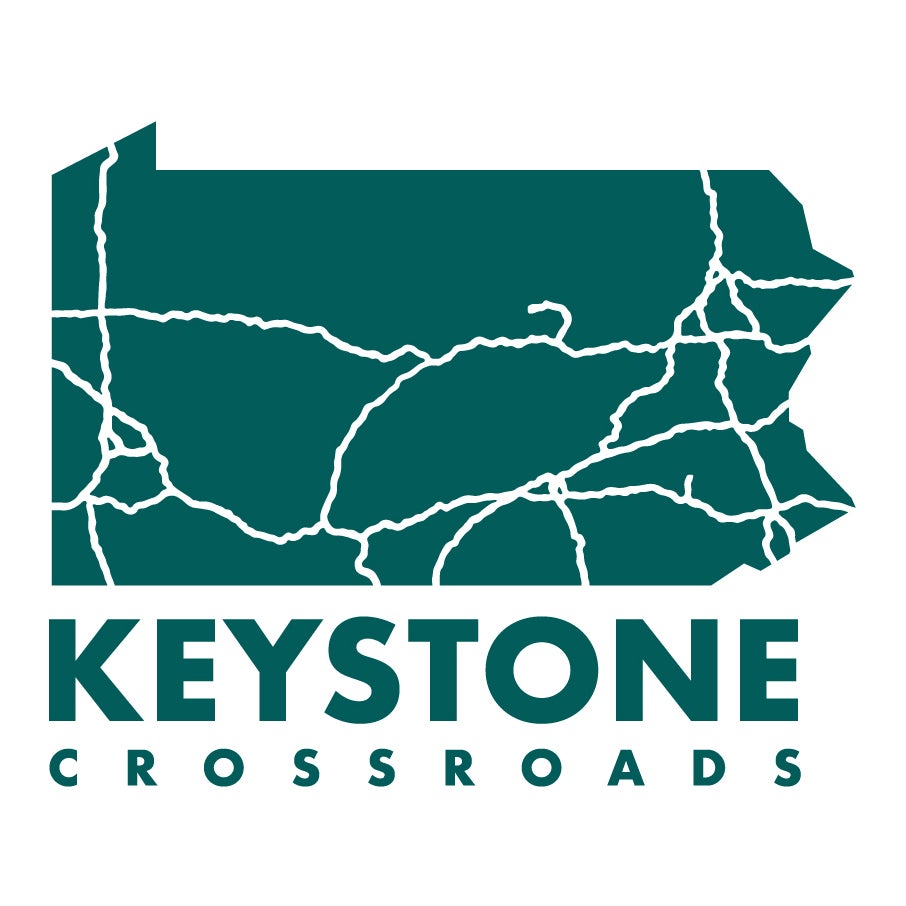
Get more Pennsylvania stories that matter
U.S. Senator Bob Casey to give blood to help fight coronavirus
U.S. Senator Bob Casey announced he will donate some of his blood after finding it contains “substantial levels of COVID-19 antibody.”
Casey says he “experienced a low-grade fever and some flu-like symptoms for a number of days” earlier this spring. He quarantined for two weeks at his doctor’s suggestion. He never got tested for the virus, he says, but the fever went away on its own. However, Casey received an antibody test last week and discovered he qualifies to be a donor.
The senator will make his first donation in Taylor, Pennsylvania in Lackawanna County today. Casey says he will continue to follow safety protocols.
Wolf gets fast-tracked, but limited state budget
A no-new-taxes $25.8 billion budget is before Gov. Tom Wolf after winning speedy approval in the Republican-controlled Pennsylvania Legislature. Also sent to the Democratic governor Thursday was legislation to distribute about $2.6 billion in federal coronavirus aid. Wolf is expected to sign both. The budget bill carries full-year money for public schools and state-supported universities. But it funds much of the rest of the state’s operating budget lines only through Nov. 30. About half of the $2.6 billion in federal emergency aid will go to counties, nursing homes and other programs for older adults.
Pandemic may be helping PA census count
Even with pandemic closures in place throughout much of the state, Pennsylvanians are filling out the census at a rate slightly above the national average.
Speaking Friday with Auditor General Eugene DePasquale over Facebook Live, Norman Bristol Colón, executive director of the governor’s Census 2020 Complete Count Commission, said the state’s response rate so far is 63.1 percent, compared to a national response rate of 60.1percent.
“A lot of individuals are spending more time at home, and they are filling out the census at home more so than ever before,” Colón said.
For the first time, the Census is being conducted digitally. Although that presents some problems for residents living in communities without reliable internet access, Colon said the current stay-at-home orders may be contributing to a higher rate of returns.
“It has been, to some extent, a blessing,” he said.
The federal government announced in April it would extend the deadline for census reporting from an original date in July to October 31st.
The census count determines each state’s share of electoral representation, as well as revenues from federal spending. According to Colón, that money amounted to around $27 billion last year.
Pennsylvania’s response rate tracks a few percentage points lower compared to the same time during the last count in 2010.
WHYY is your source for fact-based, in-depth journalism and information. As a nonprofit organization, we rely on financial support from readers like you. Please give today.




![CoronavirusPandemic_1024x512[1]](https://whyy.org/wp-content/uploads/2020/03/CoronavirusPandemic_1024x5121-300x150.jpg)
